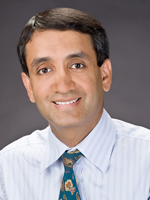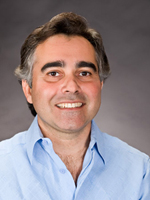Recent News
UNM Engineering team wins ASEE best paper for work on first-year engineering course
July 17, 2025
New director will enhance interdisciplinary engineering learning opportunities
July 2, 2025
Final SIRI cohort visits UNM campus
June 30, 2025
Perfetti receives ANS Landis Engineering Achievement Award
June 26, 2025
News Archives
ECE Faculty Win Prestigious International Award from Qatar Foundation to Support Cloud-Computing Research
January 10, 2013

Dr. Nasir Ghani

Dr. Majeed Hayat
ECE professors Nasir Ghani (Associate Chair, ECE) and Majeed Hayat (Associate Director, UNM Center for High Technology Materials) have received a three-year $1.05 million multi-institution grant from the Qatar National Research Fund (QNRF) to support work in the area of reliable cloud-computing services modeling and design. In particular, the project titled “New Paradigms for Robust Cloud Networking Services” will focus on studying the impact of large-scale failure scenarios on cloud-computing infrastructures and also developing a range of service survivability schemes for disaster recovery.
Modern computing paradigms are witnessing expansive growth, driven by advances in multi-core processor, storage, and high-bandwidth networking technologies. Now as related price-points continue to decline, these systems are being deployed en-masse to interconnect large data-centers and support new virtualized user services. Broadly termed as cloud-computing services, these offerings use advanced software virtualization techniques to provision customized configurations for individual client needs. Indeed, the ability to “dial-up” configurable service offerings in a “pay-as-you-go” manner can drastically reduce physical infrastructure “cap-ex” outlays as well as operational “op-ex” costs for providers.
As cloud-based paradigms take hold across the commercial and private sectors, service reliability is critical. Indeed, reliability is a major concern for many users looking to migrate their vital data and applications out into the cloud. Although many cloud service providers do offer varying types of intra-site server and storage backup, these capabilities are more localized in nature and largely ineffective against massive failures affecting wide regions, e.g., as occurring after natural disasters, large-scale power outages, and malicious WMD-based attacks. As a result, the further use of underlying cloud networking recovery schemes offers much more potential to improve service availability needs, and this remains a largely unexplored area today.
To address these challenges, the UNM PIs will partner with researchers at Qatar University (Dr. Khaled Shaban) and Concordia University (Dr. Chadi Assi) to conduct a detailed study on cloud networking survivability under this award. In particular, the UNM team will work on the design of dynamic pre/post-fault recovery schemes and also conduct detailed stochastic modeling of cloud recovery performance and reliability. Moreover, the outcomes and findings of this work will also contribute significantly toward technology advancement in this critical space. This project will run from 2013-2016 and will train several doctoral students across the partnering institutions, providing them with invaluable opportunities to collaborate with an international team of researchers.
Overall, the QNRF is part of the Qatar Foundation and is a selective and well-established funding agency that actively supports large collaborative research efforts across the globe. In its most recent cycle, the agency awarded a total of 69 proposals from about 270 submissions. In addition to this new project, Drs. Ghani and Hayat have also established a very strong research record in the area of cyber-infrastructure design, resource allocation in distributed computing systems, and disaster recovery. Most notably, the PIs have received several prior research awards from the Defense Threat Reduction Agency (DTRA), Department of Energy (DoE), and the National Science Foundation (NSF). For further information, please visit Dr. Ghani’s and Dr. Hayat’s research sites.
Dr. Ghani’s link: http://ece.unm.edu/%7enghani
Dr. Hayat’s link: http://www.ece.unm.edu/lb
